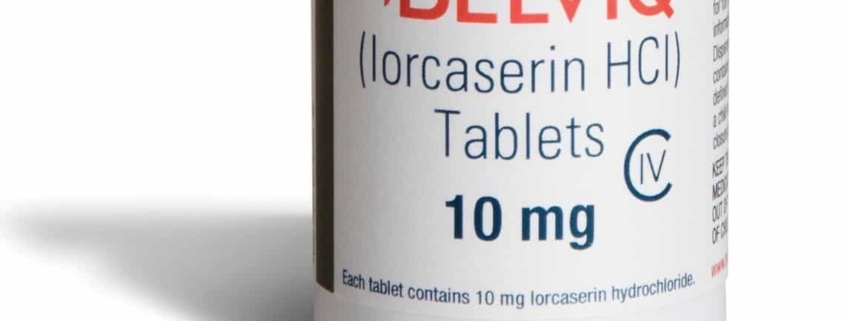Belviq Litigation
According to the Centers for Disease Control and Prevention CDC), it’s estimated that at least one-third of the U.S. population is obese, measured by the BMI or Body mass index scale.
For many, the task of losing weight is just too challenging, so a drug that promised to help you regain a more normal weight sounded like a miracle.
Until it wasn’t.
Belviq was a weight loss drug approved by the Food and Drug Administration (FDA) in 2012. It promised to be a solution for obese people who also had weight-related complications such as high blood pressure, high cholesterol, or type 2 diabetes.
Belviq was the first-in-its class selective serotonin 5HT2c receptor agonist, which claimed to control the user’s appetite. It worked by activating serotonin receptors in the brain, telling the body that it was full as if they had just had a meal.
While the drug may have worked for some, it did not prove to be a miracle weight loss drug. In three trials of almost 8,000 patients, they lost an average of 3 to 5 percent of their body weight. For a 200-pound man, that translates to six to 10 pounds.
Then there was the other issue. In some users, it’s alleged to have caused cancer. Belviq is now off the market and the focus of an increasing number of product liability lawsuits.
Belviq is also known as lorcaserin HCI. It was prescribed to people who were technically obese; that is, they had tried several diets unsuccessfully. They may also have had comorbidities such as diabetes or high blood pressure. The drug came in two forms, the original and an extended-release, Belviq XR.
Both drugs are made by Arena Pharmaceuticals and manufactured in Switzerland with Eisai Inc. While Arena manufactured Belviq, Eisai was the exclusive distributor.
As of now, both companies are named defendants. The company insists the drug continues to have a positive benefit-risk profile, as demonstrated in more than 22,000 patients enrolled in more than 30 drug trials.
Eisai and Arena
The FDA requested Eisai voluntarily withdraw the drug in February 2020 due to the risk of cancer. The companies did so.
The agency determined that the risk exceeded the benefit after looking at a long-term study on Belviq, the Camellia-TIMI 61 trial.
There were 12,000 people enrolled in the five-year study, a randomized clinical trial at 400 sites in eight countries. Clinical trials are required to receive FDA approval.
Compared to the placebo, 7.7 percent of users developed cancer, while placebo users had a cancer risk of 7.1%. That is a slight risk, considered statistically significant.
The cancers included:
- Lung Cancer
- Colorectal Cancer
- Pancreatic Cancer
- Cancer along the Digestive Tract
The risk usually resulted from a six-month or longer use, and these were the only types of cancer noted by researchers. Patients were advised to stop taking Belviq and Belviq XR and seek alternatives for weight loss. Health care professionals and hospitals stopped prescribing and dispensing the medications.
The FDA’s relationship with the pharmaceutical industry is such that it prefers to strongly suggest that a drug be withdrawn rather than mandate it be removed from the market for fear of being sued.
Shortly after it entered the market, Public Citizen issued a warning about Belviq and the possible risk of heart complications. The companies were mandated to do post-marketing studies looking for potential heart problems. Instead, the trials did show that users developed cancer after taking Belviq for a while.
Even when it was approved, there were already studies linking the weight loss drug to an increase in cancer risk, but the FDA approved it anyway and required the manufacturer to monitor side effects post-market.
The similarities between Belviq and fen-phen are undeniable.
That appetite suppression drug was also pulled from the market in 1997 because of its link to fatal heart valve problems. Arena Pharmaceuticals submitted data to the FDA showing the agency heart problems were not a problem with Belviq if taken at a low dose.
Before that, Xenical, approved in 1999, and Meridia, both weight loss medications, were taken off the market when heart problems became apparent. It was that pattern that caused the FDA to reject the first Belviq application in 2010.
Litigation
Earlier in 2021, Eisai and Arena Pharmaceuticals attempted to have the design defect claims dismissed.
In one lawsuit filed in the Eastern District of Louisiana by plaintiffs Stephanie and Robert Fuller (case no. 2:20-cv-01675), they claimed that the companies fraudulently represented to regulators, the medical community, and the public that the drug was safe and effective for its indicated use. They allege that problems with the drug were intentionally concealed from the public, and the medicine is responsible for Stephanie’s breast cancer.
On January 15, 2021, Judge Lance M. Africk agreed that the Fullers did not completely state their claim and granted the company’s motion to dismiss the manufacturing defect and breach of warranty claims.
However, the companies failed to have a design defect claim dismissed, and the case will continue in the same venue.
Litigation will focus on what the companies knew and when they knew about the weight-loss drug and the cancer risk. Aftermarket, the companies failed to follow through with studies to monitor the cancer risk. Failing to inform the public about the danger of Belviq resulted in a delayed recall, exposing many more patients to danger.
Eisai, Inc. is a Delaware corporation with a business headquartered in Woodcliff Lake, New Jersey. Arena Pharmaceuticals GmbH is a Swiss Corporation with a principal place of business in San Diego, California.
The bottom line is, as always, that the companies put profits before patients.
Patients are advised to proceed with standard cancer screenings, not special screenings, if they have taken lorcaserin.
At this time, cases are expected to be filed around the country.
Resources:
Eisai media room https://eisai.mediaroom.com/2020-02-13-Eisai-to-Voluntarily-Withdraw-BELVIQ-R-BELVIQ-XR-R-in-the-U-S
FDA Voluntary Request https://www.fda.gov/news-events/fda-brief/fda-brief-fda-requests-voluntary-withdrawal-weight-loss-medication-after-clinical-trial-shows
AARP https://blog.aarp.org/healthy-living/new-weight-loss-pill-5-things-you-should-know




Leave a Reply
Want to join the discussion?Feel free to contribute!